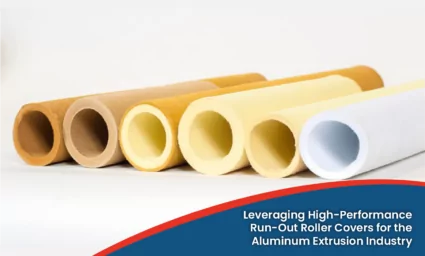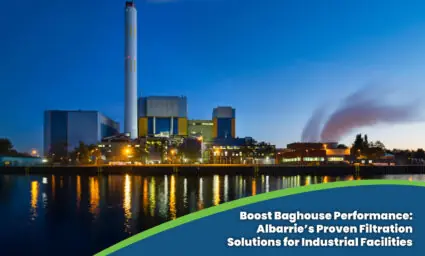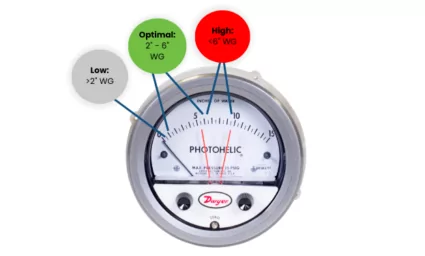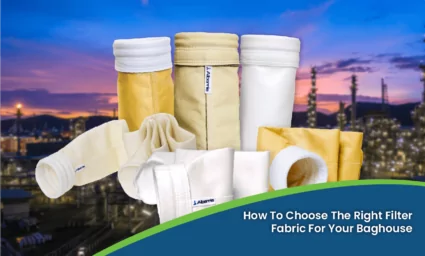

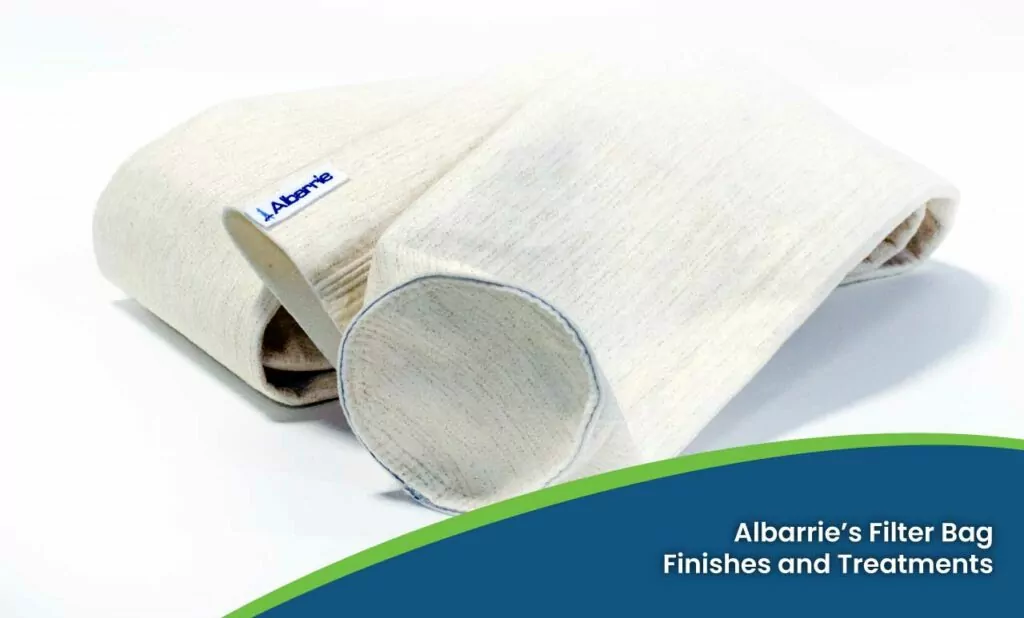
At Albarrie, we understand that industrial filtration environments demand durability, stability, and high performance. That’s why we offer a wide range of specialized custom finishes and treatments for our needled punched nonwoven filter bags with each designed to extend service life, enhance performance and stability. Selecting the right finish and treatments is more than just an option—it’s a critical part of optimizing your baghouse performance which can significantly improve how your filter bags operate under high-stress conditions ensuring better efficiency and reduced downtime.
At Albarrie, all our finishes and treatments are tested and field proven for strength, efficiency, performance and reliability in any demanding industrial environments. Every solution is thoroughly made and can be customized to fit any filter bag size or configuration.
These are the some of the most common finishes and treatments which Albarrie offers:
EPTFE Membrane
Expanded PTFE (ePTFE) is a high-performance membrane made by stretching polytetrafluoroethylene—better known as Teflon®. This process creates a microporous structure that acts as a powerful barrier against fine particulates while allowing airflow. When applied to industrial filter bags, ePTFE delivers superior surface filtration, reducing emissions and improving cleaning efficiency. Its chemical resistance and durability ensure long-term performance, while lower differential pressure saves energy, extends filter life, and minimizes downtime—helping you achieve cleaner air and lower operating costs.
Singeing
Singeing is a thermal treatment process in which filter fabric is passed over an open flame to burn off loose surface fibers. This results in a smoother finish that reduces dust entrapment and improves pulse cleaning efficiency. By minimizing blinding, singeing enhances overall filter performance and longevity. These singed fabrics are engineered for high-performance use in demanding industrial environments including cement and lime production, steel and foundries, and power plants.
Calendaring
Calendaring is the high-pressure pressing of the fabric by Heating rollers to flatten or smooth the material. Calendaring pushes the surface fibers down onto the body of the filter medium. This is done to increase and uniform surface life, improve stability and reduce shrinkage. This will help with reducing fiber migration, improves cake release, and ensures more consistent filter performance.
Glazing
Glazing involves applying heat and pressure to the surface of the needle-punched filter media, melting or compressing surface fibers to create a compact, smooth finish. This process minimizes fiber migration and pore size, improving dust cake release, reducing dust buildup, and enhancing overall durability of the filter bag. Ideal for industrial applications such as cement production, metal processing, food processing etc.
PTFE
The filter fabric is coated with a liquid PTFE resin, either coated in bath or through a spray of liquid application. This treatment significantly enhances the fabric’s flex life, resistance to heat and chemicals, and its ability to release dust particles. As a result, the filters benefit from improved durability, longer service life, and greater operational efficiency. A PTFE finish is especially beneficial in demanding environments involving corrosive chemicals, sticky dusts, or high moisture levels.
Fire Retardant
Fire-retardant treatments are where a chemical coating is applied to the surface as a treatment to lower the likelihood of a spark igniting on the treated filter media. These treatments enhance the fire resistance of the fabric, helping to prevent airborne particles from fueling a fire and potentially igniting within the system. In addition to meeting stringent fire safety standards, fire-retardant fabrics can also help contain an existing fire—limiting its spread, minimizing damage, and reducing the risk of smoke and fire affecting other parts of the baghouse system.
Hydrophobic
Hydrophobic treatments involve chemically or physically modifying the surface of filter media to repel moisture, typically through water-repellent submersion. This fabric impregnation prevents water absorption, which is critical, as moisture can significantly degrade filter performance by causing pressure drops, impeding airflow, and leading to clumping of the filter material. With Albarrie’s advance Montex stenter machine technology, hydrophobic finishes can now be applied more efficiently and uniformly, enhancing throughput and treatment effectiveness.
Acid Resistance
This treatment is a protective chemical which is applied to materials to prevent degradation or damage caused by exposure to acidic substances. The enhances the material’s durability, chemical stability, and service life in harsh environments, making it ideal for applications in industries such as chemical manufacturing, mining, cement production, and waste incineration.
Having a wide range of treatment, finish and support options is a major advantage for businesses, allowing them to rely on a single trusted source—like Albarrie. With over 40 years of experience, Albarrie provides the right filtration bags, backed by the expertise you can count on. Albarrie goes a step further by offering the ability to combine various specialized finishes and treatment, creating a unique customized solutions that deliver the specific performance attributes needed to support both baghouse efficiency and overall business requirements.
